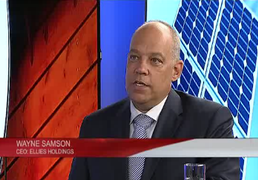NEXT to your relationships with family and friends, your relationship with money is one of the most important, and if managed properly can save you a great deal of anxiety and time.
Therefore, when setting goals for yourself, financial stability should always be at the top of your list.
Often people plead ignorance when it comes to how much money they spend versus how much money they have coming into their bank accounts. Small changes, which might seem insignificant, can have a profound impact on your finances in the long term. So spare yourself the humiliation of having your car repossessed or the frustration of paying off a never-ending loan by adopting some of these small changes:
1. Have a budget
It is as simple as it sounds. Put aside money for your living expenses such as bond/rent, car repayments, utilities, school fees and any other important monthly payments.
"Everyone earning an income should have a budget. A budget tells you what expenses you have and need to pay. You can then easily compare this to your take home pay," says John Marnitz, a certified financial planner from Pioneer Financial Planning.
2. Succumbing to ‘cheap’ deals
Try to avoid impulsive purchases by spending your disposable income on ‘cheap’ deals. Ask yourself, ‘Do I really need this?’
"Remember the old saying: ‘if it sounds too good it probably is’? There are no cheap deals. Your savings depend on your personal needs but there should be long-term savings, ie retirement savings and then savings for the short to medium term. This could be used for many things depending on the individual," says Mr Marnitz.
3. Not having (the right) insurance
You need to be responsible by making sure you’ve got medical cover in the event of an accident or illness. Don’t forget to insure your possessions. Most importantly, do your research and choose the insurance that is best suited to you.
Mr Marnitz says the most important insurance cover is medical aid, even if it is a hospital plan, as well as car and life insurance.
"Especially if you have kids and there is still debt to be paid off. In the case of your passing at least the life insurance could settle debt like bonds, schooling etc, it doesn’t leave a burden to the remaining family members," he says.
4. Keep an eye on your expenses
"Be smart about what you buy. Ask yourself do you really need it? And can you really afford it? One can answer this question if you are truthful to yourself," says Mr Marnitz. Even the small, unplanned purchases count when you add them up.
5. Avoid unnecessary debt by all means
There is good debt and bad debt. For example, a loan taken up to buy a house or a car is considered good debt, as is a student loan. While buying clothes and food on credit and financing holidays using credit cards should be avoided at all costs.
"Consumers should avoid taking credit and try to plan ahead. It helps to have an emergency fund to assist should the need arise. In cases where there is no emergency funds consumers must borrow only what they need, provided they will be able to repay the loan. Plan the repayment amounts and term of the loan before taking on credit," says the National Credit Regulator’s Lebogang Selibi.
For Mr Marnitz, credit cards should be an absolute last resort.
"A credit card is the worst, but if you are using a credit card at least try paying it off by the end of the month. Sure we all have debt, just make sure when you sign into any agreement it’s within your budget," he says.
6. Failing to save and invest
When it comes to saving and investing, something is always better than nothing. Investigate various types of savings vehicles on offer.
For example, the government’s high interest rate earning retail savings bonds, which can be purchased online, at Pick n Pay or from any Post Office branch at a minimum investment of R1,000, or the various bank deposits offered by SA’s major banks, which allow you to put away as little as R100 a month into an interest-bearing account.
So what percentage should you put into savings and how much should one invest?
"If you get paid a bonus, 1/3 should go to retirement savings, 1/3 on medium/short-term savings and 1/3 you can spend on yourself (spoil yourself). If possible then also pay extra into anything that you still owe money on," explains Mr Marnitz.
7. Living beyond your means
Don’t go broke trying to look rich, it could cost you dearly.
Mr Marnitz emphasises that if you have a budget and you systematically stick to it, then you will not fall into this trap.
Other than social pressures, however, there are other reasons people fall into this trap.
According to Ms Selibi, overindebtedness is also the result of ignorance of financial products, lack of proper planning, reckless lending, a change in circumstances (ie divorce, retrenchment, death), an economic upswing and over-indulgence.
8. Failing to ask for help
So you’ve finally arrived at the point where you admit to yourself that you are struggling to make repayments and you’re drowning in debt. The most important thing to do is seek help, and speak to your credit providers before you lose your possessions or worse still, get blacklisted.
Ms Selibi advises the following:
• Go back to your budget and see if there’s anything you can cut or decrease. If after doing this you still cannot cope then;
• Communicate your situation with your credit providers to restructure your debt.
"If credit providers are not willing to assist, consumers have a choice of going under debt counselling where a debt counsellor will restructure consumers’ debts and negotiate with credit providers — though this comes at a fee and consumers should also take note that once they go under debt counselling their names will be flagged at the credit bureau and they will not get further credit. However, debt counselling gives them protection from credit providers’ legal action," says Ms Selibi.
9. Ignorance about your finances
You cannot cry foul for failing to read the small print, assessing your bank statements or following up on queries with credit providers and financial institutions.
"Consumers should check their pre-agreement statement and quotations and also check and understand their credit agreements before they sign for it. If they don’t understand, they should not sign. It must also be noted that the pre-agreement statement and quotation is valid for five working days; it is ‘okay’ to take it home if they do not understand. It is important to also check your bank statements to track what goes in and out and query debits and credits that you are unsure of," says Ms Selibi.
10. Leaving your job before securing another one
While you may have your personal reasons for wanting to leave your current place of employment, it is recommended that you only resign once you have secured, in writing, a job somewhere else.
SA has a high unemployment rate, and it is difficult for even the most skilled and qualified people to find employment.
"This is a basic no no," says Mr Marnitz. "If something goes wrong with you getting the next job then how will you pay your expenses? Some people might have some savings here and there but the last thing you want to do is use these savings because you didn’t secure a job. So make very sure all is okay before resigning. It will have a massively negative effect on your finances."

























Change: 1.61%
Change: 1.50%
Change: 1.82%
Change: 0.74%
Change: 4.50%
Data supplied by Profile Data
Change: -0.27%
Change: 0.26%
Change: 1.61%
Change: 0.00%
Change: 0.35%
Data supplied by Profile Data
Change: -0.30%
Change: -0.27%
Change: -0.30%
Change: -0.07%
Change: -0.46%
Data supplied by Profile Data
Change: 1.58%
Change: 1.07%
Change: 1.14%
Change: 3.88%
Change: 0.05%
Data supplied by Profile Data